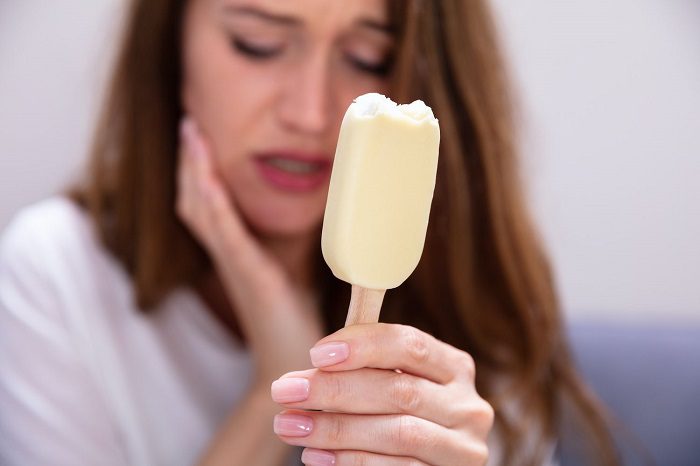If you have ever bitten down on something and felt a sharp pain in your tooth, then you are familiar with tooth sensitivity. This form of tooth pain will feel excruciating but then fade as soon as you take away the stimulus touching the tooth.
Though intermittent, tooth pain of any kind should warrant urgent evaluation and intervention from your dentist. Tooth sensitivity can develop as a symptom of a larger dental problem, so you should contact your dentist as soon as you can.
Do not wait until your next regularly scheduled dentist appointment to let your dentist know about the issue. Learn more about this type of dental emergency, its cause, its treatment, and its prevention in this month’s blog.

Why Do My Teeth Feel Sensitive?
Tooth sensitivity happens when the outer layer of your tooth (enamel) wears down or erodes to reveal nerves within the interior of your tooth (dentin). An external item, like food, touching these nerves will send pain signals to the brain, resulting in tooth sensitivity.
The pain will stop if you remove the stimulus, but the enamel damage will remain. Enamel cannot regenerate, so you will need to visit your dentist to restore your dental structure and relieve sensitivity and pain. Enamel erosion can occur for a number of reasons, and the treatment of this pain will depend on its cause.
How Will My Dentist Treat Sensitive Teeth?
Your dentist can offer tooth sensitivity treatment that will resolve the root cause of this pain. In mild cases, a dentist might suggest using a desensitizing toothpaste. This product contains ingredients that block nerves in dentin from transmitting pain signals. Then you will no longer feel tooth sensitivity.
Sensitivity pain might also happen if you have a cavity. A dentist can treat this early form of tooth decay with a dental filling, and they alleviate any pain related to this problem as they do so.
A dentist might also opt to replace lost enamel using a dental crown. The ceramic cap will cover the tooth, creating a shield that stops stimuli from reaching the exposed dentin. You will no longer have to worry about tooth sensitivity after this treatment.
Can I Prevent Tooth Sensitivity?
Many factors can contribute to enamel erosion that will leave you with sensitive teeth. For instance, your diet might wear down your tooth enamel. Acidic and sugary foods and beverages will eat away at your teeth over time. Pay attention to your diet and limit your consumption of these types of foods.
Poor oral hygiene could also hurt your tooth enamel and give you sensitivity pain. Your teeth collect plaque naturally throughout your day, and you remove it in a timely fashion by brushing and flossing your teeth. But if you do not complete this routine thoroughly and consistently, plaque will linger on your teeth and harm your enamel.
Make sure you brush your teeth at least twice each day and floss on a daily basis to get rid of plaque before it hurts your smile. Attend routine teeth cleanings with your dentist to maximize preventative dental care too.
